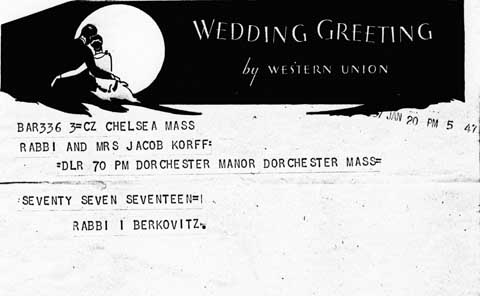
|
Adele Korff Gass:
Growing Up in America, Courtship and Marriage
|
|
“Max was dressed in a white cotton kittel (robe), as a symbol of purity.
Escorted by his father, my father, and the rabbis, he walked down the aisle
first and stood under the canopy. Then I came, accompanied by my stepmother,
Auntie Etta, and Max's mother, Lena. Etta and Lena carried lit candles and I led
them in a procession around the chupah, circling the groom 13 times. Then I
joined Max under the chupah--standing on his right side.
|
|
|
Max and Adele’s marriage certificate |
“I have a very long ketuba
(marriage contract) handwritten in Hebrew by a soifer` (scribe). It guaranteed
that Max would support and take care of me and that I wouldn't be in want. It
also guaranteed that I would be a good wife and provide Max with children.
During the wedding ceremony after the wine was blessed and Max gave me a ring,
the ketuba was read out loud in Hebrew. Nobody except the rabbis and the
yeshive bokhers (Yeshiva students) understood it. Near the conclusion of the
ceremony the Sheva Berachot (Seven Blessings) were recited. These
blessings place the bride and groom within the context of Jewish history,
beginning with creation of the world and the Garden of Eden when life was
perfect, and ending with the prophecy of the end of days when life will be
perfect again. The honor of bestowing the blessings was divided among the many
rabbis attending so each could play a role in the nuptials. The entire ceremony
from beginning to end was a very long and drawn out affair. Max and I were
famished--following custom we had both fasted all day.
“At the end of the wedding ceremony, Max broke a glass. I always thought this custom was sexual in nature, to symbolize the breaking of the hymen, but it also has a more spiritual meaning. The broken glass serves as a reminder of the destruction of the Temple in Jerusalem. In moments of great personal joy we must not forget the harsh realities of life.
“After the ceremony, the fiddler began to play again. Max and I were led to a small room to spend 15 minutes alone together. This custom, called yichud (togetherness), dates back to antiquity when the bride and groom consummated their marriage in a tent immediately after the ceremony. In modern times, the yichud is used to break the fast of the bride and groom and to give the newlyweds a breather. We were provided with a small snack. Our wedding pictures were photographed in a bathroom because there was no room any place else.
|
|
|
Adele and Max with some of their female family members. Seated left to right: Minnie Gass Naimark, Rachel Razin Kessel, Lena Kessel Gass, Max Gass, Adele Korff Gass, Etta Korff, ? Twersky; Standing: Sara Kessel Michaels, Sonya Gass, Becky Kassel, Sara Gass, Minnie Gass, Anna Gass, Patty Gass, Betty Korff, Nesha Korff, Miriam Twirsky, ? |
“The simcha (celebration) consisted of a meal--the seudat mitzvah--and
dancing. It was held in the Morton Street Hall, an enormous ballroom. My
father's klezmer band provided the music. Since men and women are not permitted
to touch, the men danced together in separate groups, in circles. The rabbis
took turns dancing with me. They never held my hand--they grasped onto one end
of a handkerchief and I held onto the other. Max and I danced this way, too.
“In Jewish tradition, the bride
and groom are considered to be married the first night. The couple is put in a
room alone together to consummate the marriage. Because there is bleeding, the
woman is then considered unclean so she and her husband must remain separate for
seven days. But Max and I didn't want to stay with anybody, so each night we
went to Sharon, Massachusetts, which at that time was a summer resort.”
“Every morning we returned to my
father's house in Dorchester for prayers and a breakfast. There were long tables
and chairs set up in my father's shul. The men and women sat separately. Max sat
up front with the rabbis. I stayed with the other women. Each day there was a
catered lunch and dinner, too. At the end of the morning and evening meals the
Seven Blessings were recited again and special guests were honored by being
asked to give one of the blessings. The rabbis summoned me and I sat across the
table from my husband until the blessings were over. At night speeches,
storytelling, and singing came after the blessings. There was music and
drinking, and following Jewish custom, the men danced together but not with the
women. This went on for seven days.”
|
|
|
Rabbi Baruch Korff, Grand Rabbi Twersky, Max Gass, Grand Rabbi Jacob Korff, Grand Rabbi (?) from New York, Samuel Gass, and Rabbi Samuel I. Korff |
|
A sampling of the
congratulatory telegrams and letters that Max, Adele, and their fathers
received from well-wishers (click to enlarge) |
 |
|